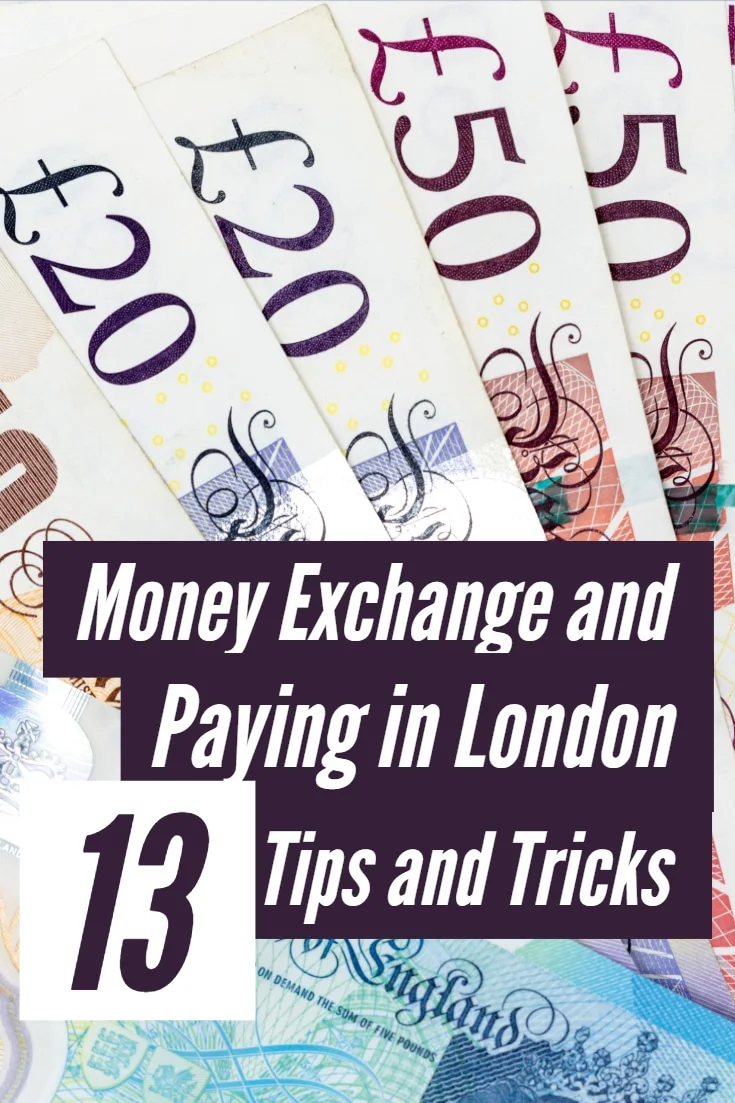If you’re planning a trip to London and you have questions about money, you are not alone. With so many options available you will have no trouble finding solutions on how to spend your money and advice for paying for things in London.
One of the first questions you probably have is, should I exchange money before I go to London? You should exchange some money before you leave but plan to get the rest in London. When you do, remember that London and the rest of the UK do not use the Euro. Since London is one of the world’s financial capitals, you will be able to access your money and spend it pretty much as you do in the U.S.
As London is a mecca for tourists, they want you to spend your money. Here are some things to know and even a few tips and tricks to have up your sleeve before you head across the pond.
Disclaimer: Hi! this post may contain affiliate links which will take you to online retailers that sell products and services. If you click on one and buy something, I may earn a commission, see my Affiliate Disclosure for more details.
Think Pounds, Not Euro
When the euro was first proposed as a single currency for the European Union (EU), the UK Prime Minister (Tony Blair) decided that the euro needed to pass five economic tests. The tests didn’t meet the expected outputs so the UK opted to keep the pound (technically the “pound sterling”) as its official currency.
Therefore, if your stay is only to London or the rest of the UK, then you will only need the British Pound. If you are planning to travel in the rest of Europe, then you will need Euros or those countries’ currencies.
Deciding on the amount of each to take will require some planning. We’ll talk more about that later. First, let’s decide where to get your pounds sterling.
Is Exchanging Money Before Traveling a Good Idea?
You should make a decision based on numerous factors, including:
- How much time you have before leaving?
- Whether my travel card will give good rates for the destination
- If the destination is cash-driven
- Your comfort level about how much foreign currency you want to have with you
If you have plenty of time before leaving, then you should consider getting some pounds or find a travel card that suits you.
The security of having some British pounds as soon as you arrive in London is nice but make sure you always find the best place to exchange your money. Banks will usually give you worse exchange rates and charge additional fees.
How To Turn Your Money into Pounds?
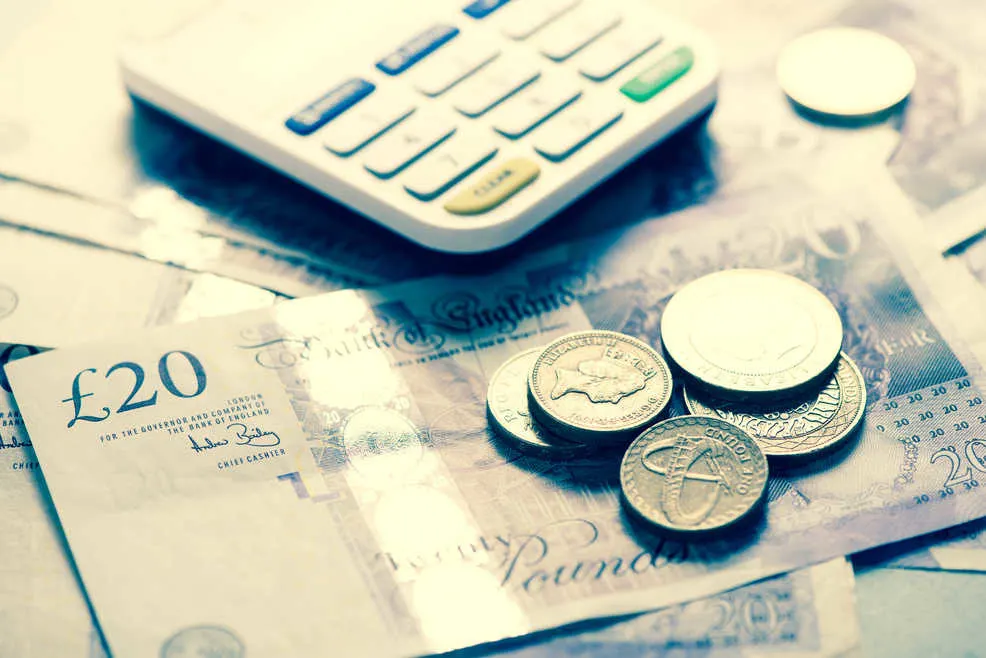
As someone that travels constantly getting the best rates for my money is very important! I always recommend Googling the best travel cards or exchange places in your hometown or city before purchasing pounds.
You have several options for getting hold of those pounds.
- Pre-paid travel card
- Travel Credit Card
- Money Exchange Places
- Large National Banks
- Your local bank or credit union
- In America you can go to AAA offices (American Automobile Association)
- Post Office
Travel Card
Finding a travel card (debit or credit) that suits your needs and the trip is important. London is slowly becoming more card only so I would recommend travelling with at least one card. Countries like Sweden are already leading the way with becoming card only economies.
When choosing a card bear in mind a credit card will give you additional support when travelling and debit gives you cheaper withdrawals (in most cases). For this reason, I like to travel with both.
In the UK you will find the common ones Mastercard and Visa are more widely accepted in the UK but American Express is very easy to use in London and major stores.
Getting Money from Your Bank
If you have an account at one of the major banks, such as Bank of America, Wells Fargo, or Citibank (follow the links for more information), then the transaction will be fairly easy. You can order in person or online, but you will have to wait for several days to receive your pounds.
Smaller banks and credit unions will typically also be able to exchange currency. You might not get the best rates with a smaller bank, but you will avoid the delivery fees that larger banks charge to deliver the bills to you. Whether you use a credit union or a larger bank, you will have to wait a few days to receive the pounds.
Why We Got Some Pounds Before Traveling
Before I lived in London, I travelled to London a few times. Each time I made sure that I went to my local money exchange to get out a £100 before coming to the UK. I also have my 28 Degrees Mastercard (Australian based credit card) and normal banks cards with me.
It was super easy to get the money I told them how many British Pounds I wanted and next thing I knew I had the cash in my hand.
I hate having to deal with airport kiosks or currency exchange stores. This way if I need a taxi, a bottle of water or some food I was set. It’s a little comfort blanket when travelling.
Why Getting Money While on the Way is a Bad Idea
Don’t.
Airport Kiosks will have the highest fees and poor exchange rates, so only use them as a last resort. Even airport ATM’s will give you poor exchange rates so walk past them as quickly as possible and head into the city before exchanging or using an ATM (if possible).
Getting Money in London
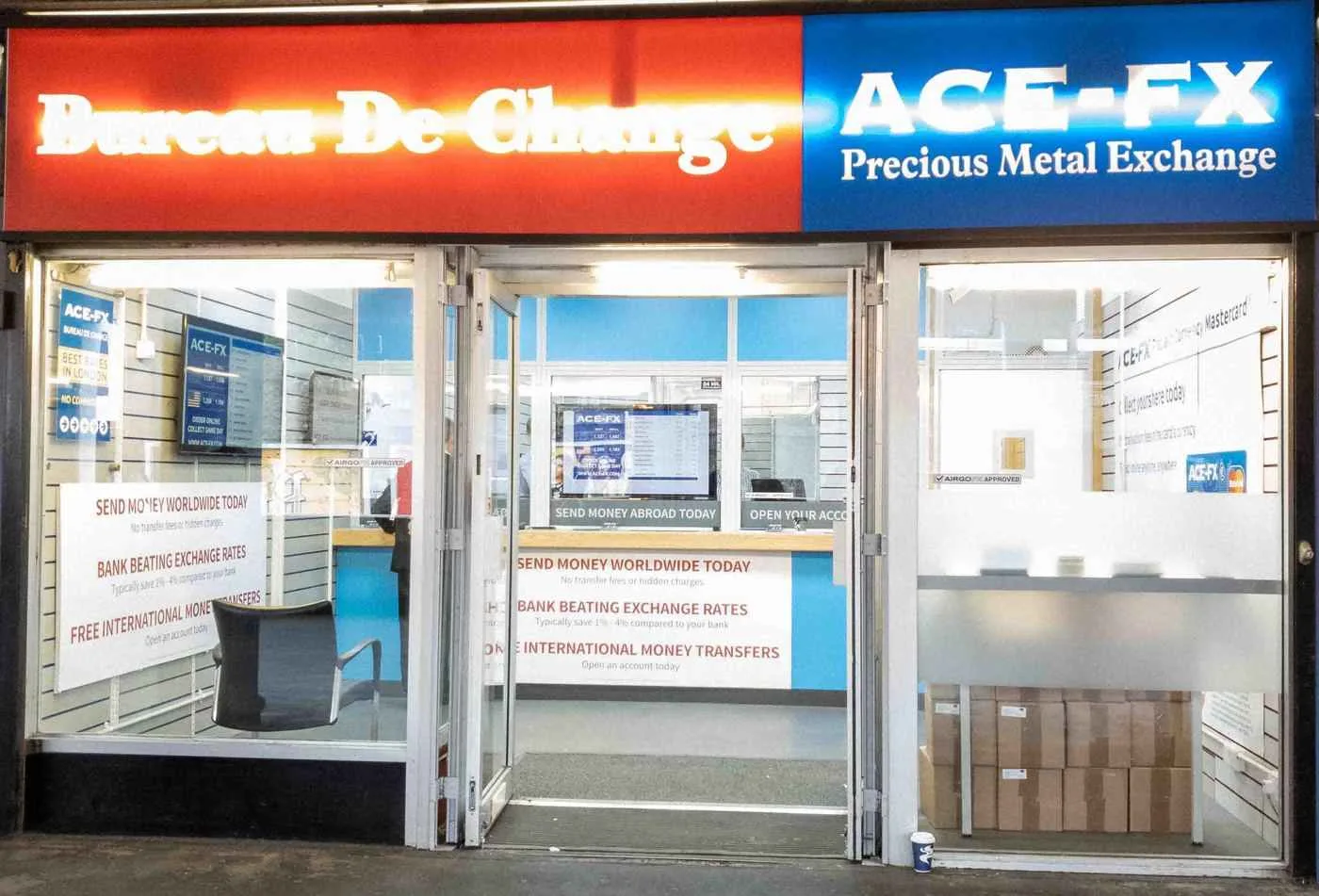
There are numerous places to exchange money in London and whenever I need of an exchange place I always tend to end up at ACE-FX (mainly because it’s on my commute). Thomas Exchange Global, Eurochange and UK Post Offices are a good place to start if you don’t have time to research before exchanging.
To see the best rate use the buyback function of Money Saving Experts, simply put in your home currency and how much you want to exchange, the result will appear with the best exchange place that day.
If you are trying to find a money exchange on the street look for the bureaux de change signs.
In tourist areas, you will often see currency exchange kiosks or storefronts. They will post their rates, which will usually look to be quite favourable. But read the fine print—there will be fees associated with the transaction. Add in those fees, and that favourable rate isn’t so favourable.
Banks are another option but generally, require you to have your passport.
Find a Cash Machines Instead
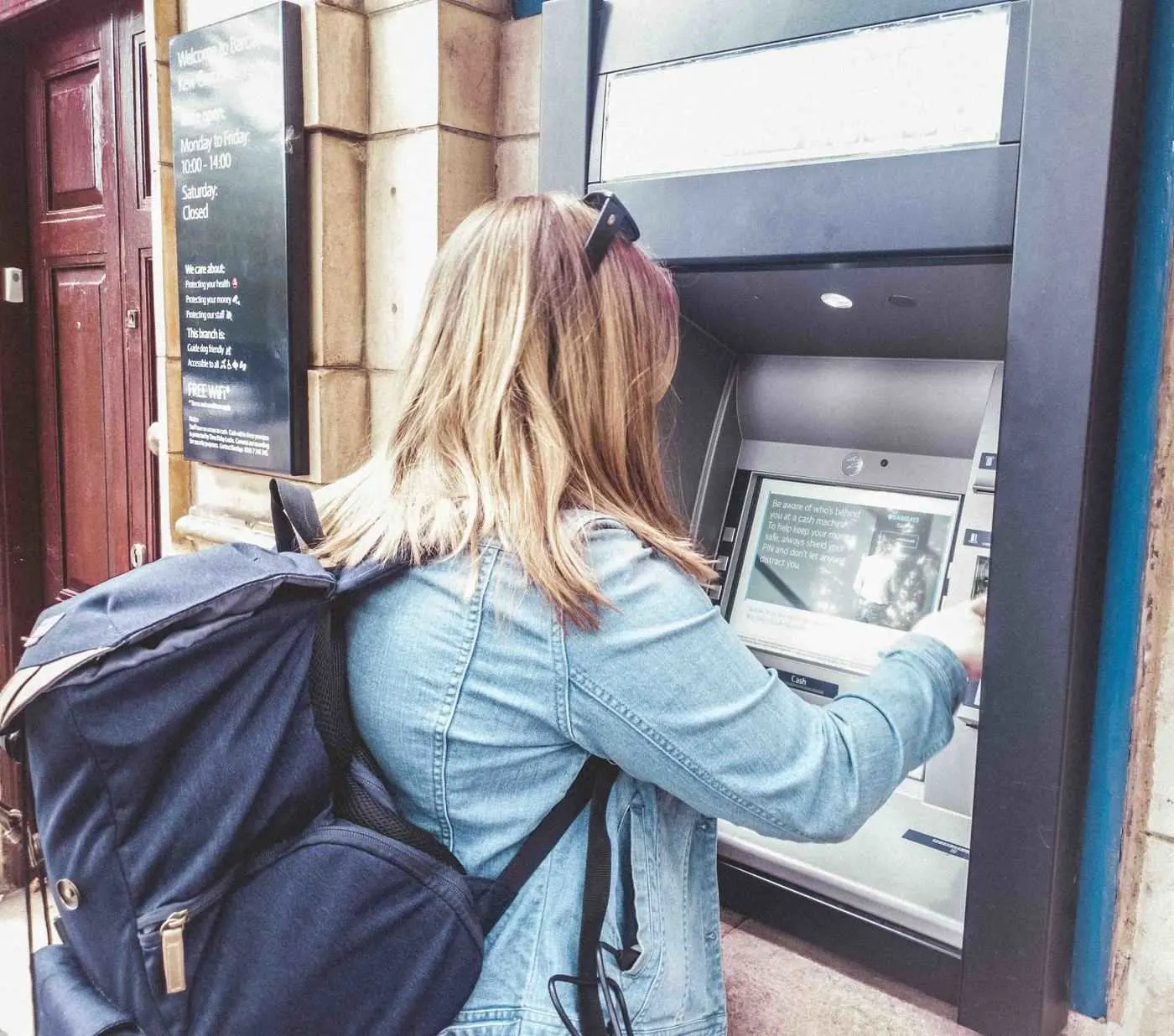
ATMs are everywhere in London. Savvy travellers walk past currency exchange vendors, banks, hotels, or the bureau de change (the French name for British exchange counters) in the post office and head for the nearest ATM. If you have the right travel card this will always be the winner option.
They will be easy to spot at airports, banks, and other high traffic areas. However, if you are off the beaten path (you rented a B&B on a quiet street), Link Q provides an online service that will show you nearby ATMs. You can download the Link app or use their website to locate one near you.
Things to Keep in Mind When Using the ATM in London
You can use your credit or debit card to get pounds. Put your card in, enter the pin, and make a withdrawal. You will receive your card back first and then the cash.
Do not accept the currency conversion by the ATM! This will always give you the worst exchange rate. It will give you an idea of how much you are taking out which is always a good indication to ensure you have enough money to withdraw.
Some important advice:
- You may have to pay fees so double-check what fees you will be charged before you leave
- Visa and Mastercard will work anywhere; American Express sometimes; and Discover won’t
- Cards with Visa and Mastercard logos are ideal as they are most commonly used
- If you’re worried that your bank or credit unions card won’t work, consider opening an account a different account or getting a prepaid travel card—at least for the trip
- It’s a good idea to have a back-up card in case the ATM, for various reason, the ATM is hungry and eats your card, the card gets demagnetized or the card doesn’t work.
- Contact your bank(s) before you leave so they have the dates and location of your travel. Even if they say you don’t need to, do it anyway, there is nothing worse than being overseas and your card is blocked.
Debit cards in most cases will have fewer fees associated to them, I say this as I did have a credit card that was specifically for travellers and provided better rates than my debit card. Generally, avoid using your credit card in an ATM, unless it’s an emergency. Cash advance fees, transaction fees, exchange fees—that’s a lot of fees. On top of that, your bank may charge higher interest rates for cash advances.
One last thing: A lot of ATMs in London don’t always have letters on their pins, so if you have memorized Always Scramble Your Eggs, memorize 2-7-9-3.
Using Money in London
London is moving towards paying electronically so you want to have at least one card when travelling to the UK but ideally two cards.
- Your credit card is good for larger purchases (hotels, shops, car rental agencies) and for ordering online. I also like paying with a credit card for the protection they provide to your purchases, it’s my go-to card in London.
- Your home countries cash is a good back-up. I like to have a hundred dollars for an emergency. You never know if the ATMs won’t work, all your cards get rejected, and you’ve run out of pounds. Cash is cash.
- But keep the cash as a back-up and never use it at places that say they accept foreign currency. You will receive the worst exchange rates.
- Pounds sterling.
Paying by Card
Card is widely used in the UK and in London some places are turning card only, so it is essential that you have the ability to pay by card.
Paying Electronically (Phone, Watches, etc.)
In London, especially, it is becoming easier to pay for goods or services with your phones. Although they are not universally used yet, more and merchants are accepting ApplePay or GooglePay, with ApplePay being accepted at more locations. Both services work with Visa or MasterCard debit or credit cards.
Having said that, you will still be paying in pounds so having the right card is essential otherwise you will be charged an exchange fee.
What About Those Euros?
If you have some Euros, will you be able to spend them in London? There are two answers: no and maybe
- No. Most shops won’t accept euros. It’s not worth the hassle to them.
- Maybe. Large department stores in London will take euros. Harrods, and Selfridges, for example, will. Marks and Spencer even have bureaux de change in its larger stores.
- But even if you can get someone to take your euros, you should consider that it is a foreign currency transaction with hidden exchange rates
- Smaller stores often have clerks not familiar with taking foreign currency, which will mean more time waiting to pay and less time for exploring
- Euro coins will almost never be taken
- Your chances of paying with euros outside of London is practically nil unless you’re at the airport.
If you plan to travel to Europe after leaving London, get Euros once you arrive at your next destination (unless you want to pay for two exchange rate fees—dollars to pounds, then pounds to euros). If you are visiting London after a European visit, plan ahead so you aren’t stuck with euros that you probably won’t be able to use in most of London.
About coins: coins for larger denominations are quite common in Europe. You won’t be able to exchange them when you get back home (but you will be able to exchange your pounds sterling!). Unless you want to add them to your coin collection or have them to show off (British money is quite fascinating), spend them on knick-knacks, exchange them for paper money, or give them away.
Is British Similar to American Money?
In concept, yes. Pounds sterling, or pounds, are divided into 100 units, just as our dollar. The coins will look different, but the principle is the same. Anything under a pound is called a penny, as in 50 pence
- Larger coins are more commonly used. If you’re changing is under 5 pounds, expect to receive coins. 1 pound and 2-pound coins are common
- Differences in coins are not based solely on size or colour; there are also differences in shapes
- There’s a 2 pence coin
You will usually hear British people say “pee” rather than pence, as in 50p (50 pee). More colloquially, a pound is known as a “quid”, a five-pound note is a “fiver” and a ten-pound note a “tenner.”
In appearance, no. Bills larger than a pound—called notes in London—come in the same denominations you are used to. However, the notes have many surprising differences.
- Size–Not all notes are the same size
- Feel–They have a smoother feel than dollars
- Security features are more obvious
- Colour—not all notes are the same colour
At first British notes take some getting used to. You might decide to take some home as a souvenir. They are great conversation starters, especially if you have gathered some friends and want to talk about your trip.
Money in the Rest of the UK
Just to add a little more confusion to the mix—money in all of the UK is not the same. Both the Bank of Scotland and the Bank of Northern Ireland have their own versions of the pound sterling. They have the same value, but different images for the notes and different engravings on the coins. If you visited either of those places and then head to London, you may encounter some difficulties using them.
It is still a legitimate currency in the UK, but some places can be funny accepting it. To get around this just pop into a bank and they will be able to give you the English version. I tend to find that chain stores will accept the currency with no issues.
Staying Safe with Money
London is considered a safe city by most measures. With any city, there are things you need to be careful of. Here are some things to watch out for:
- Pick pocketer which operate mainly in high tourist areas and crowded trains (tubes) or buses. Be on alert and ensure your wallet is kept in a place you’ll notice something happening. I personally like to keep my wallet in secret pocket or in a hard to get place in your bag, in your front trouser pocket or keep your handbag at the front of your body.
- Try to avoid walking alone at night in places such as parks and side streets or any unfamiliar environment. If you do have to walk, stick to busy places where is a lot of activity CCTV and good lighting.
Of course, any time you go into a touristy area you risk spending money on things you could purchase elsewhere for much less.
A Pretravel Checklist
- Make sure you have contacted your bank regarding travel dates and locations
- Check your cards for expiration dates
- Memorise your pin
- Adjust your ATM withdrawal limit. You will want to exchange larger amounts if your bank charges a single withdrawal fee.
- European ATMs will withdraw funds from your checking account, not your savings account
- Ask about fees so you won’t be surprised later
- Traveller’s checks will incur extra fees and lines at banks to cash them. Not worth your time
Determining How Much Something Costs
Wonder how much that cup of coffee costs in American dollars? You can use a currency converter, but why would you use up your phone data when you can use your head? Since the pound is decimalized, knowing the currency rate and doing a little mental math will get you to a close estimate.
Say the currency rate was 1.3 pounds for a dollar. Since the price charged is the price you pay—taxes are calculated in the amount—your 3 quid cup of coffee costs you $3.90. Of course, it was a freshly-made Americano, not something that might have been sitting around for two hours.
Final Thoughts
Hopefully you are travelling to London for pleasure, or at least you are able to add a little pleasure if it is a business trip. If you do some planning ahead, you will be able to limit the extra expenses so that you come home with fond memories, some treasures (who can resist buying something a little extra), and no surprises.
More London Articles
- Do all Phones Work with UK Sim Cards? What to Know Before Visiting.
- Do You Tip Hairdressers and Nail Salons in London? A Guide.
- 26 Things You Can Only Buy in London
- A Helpful Guide on What to Book Ahead in London by a Local
- First timers guide to London – COMPLETE WITH INSIDER TIPS
- Do You Ask for the Check in London? A Guide to Tipping
- A Guide to Cycling in Hyde Park (With a Handy Map)
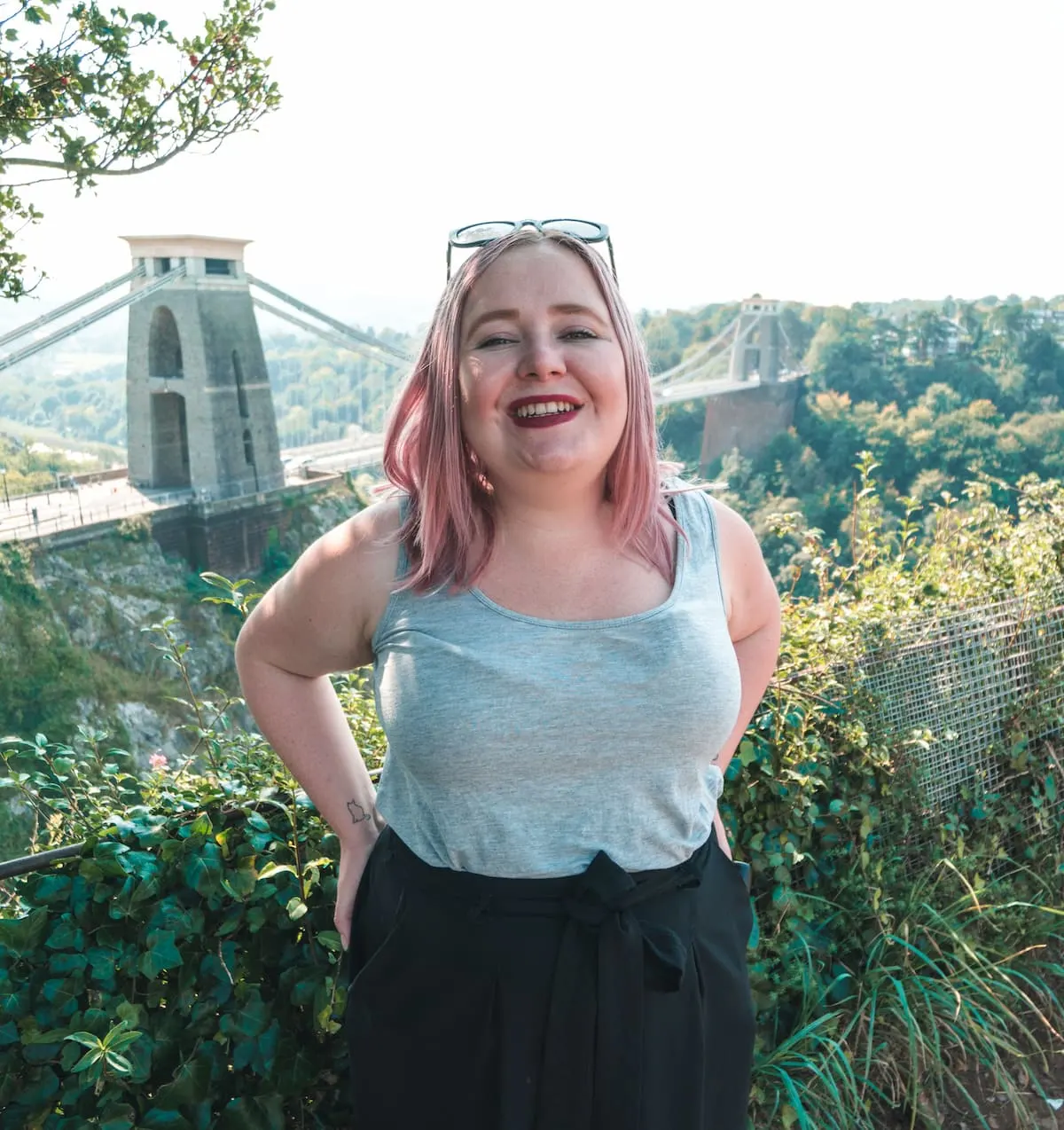
Kat
Hi, I'm Kat, an Australian that moved to London in 2013 to start a new adventure. What a roller-coaster that was! I love helping others move to the UK and people explore the world! I’d be honoured if you’d say, “Thanks!” with a £3 coffee on Ko-fi.

